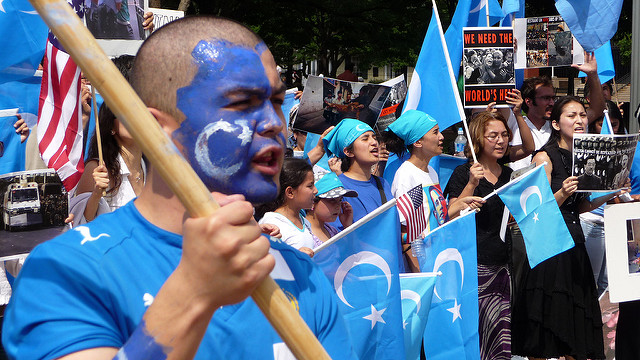Unintended Consequences: Trump’s Trade War Opens Avenue to Fight China’s Rights Violations (February)
For February 2019, the Rights Writers discuss their issues in the context of US political discourse (including public opinion), particularly in light of the two-year anniversary of Donald Trump’s presidency.
President Donald Trump’s unconventional rhetoric and governing style has shifted the United States almost fully away from the upkeep of human rights. Despite America being a past global champion of human rights, the responses to China’s human rights abuses in the past two years have been lackluster. It is easy to blame the president for the muted reactions; however, Trump’s policies regarding human rights violations in China has remained largely consistent with those of past administrations. Ironically, the combination of hostile rhetoric and increased tariffs may have actually provided an opening for the United States to encourage some positive human rights actions in China. Nonetheless, critiques of President Trump’s inaction are valid. The movement of the president away from human rights issues could indicate that even with opportunities and options to push China on human rights, Trump may choose to act otherwise.
 https://ro.wikipedia.org/wiki/Fi%C8%99ier:Peng_Liyuan,_Xi_Jingping,_Donald_Trump_and_Melania_Trump_at_the_entrance_of_Mar-a-Lago,_April_2017.jpg
https://ro.wikipedia.org/wiki/Fi%C8%99ier:Peng_Liyuan,_Xi_Jingping,_Donald_Trump_and_Melania_Trump_at_the_entrance_of_Mar-a-Lago,_April_2017.jpg
The largest human rights violation by the Chinese Communist Party in the past two years is the internment of over 1 million people, mostly Muslim minorities such as the Uighur and Kazakhs, in the Xinjiang province of China. Although China claims these camps to be “professional training centres – educational centres,” there is increasing evidence that these camps are a system of forced labor, alongside with efforts to control and indoctrinate the minority population in order to remove their devotion to Islam and erase their ethnic identity. Since the reveal of China’s internment of ethnic minorities in September of 2018, the United States, along with the rest of the world, has not yet formulated any policies to hold China accountable for its actions as of February 2019. This lack of policy by the United States is, unfortunately, consistent with the past incidents and is not unique to the Trump administration. Despite the State Department seeming as though they would take action in mid-September, any policies regarding the camps have yet to be rolled out. Even the 115th Congress failed to pass a bill to address China before recess (although the bill has been reintroduced in the 116th Congress). Similar to his predecessors, Trump’s administration is guilty of inaction. Most presidents have taken little concrete action to hold China accountable, such as the case of Obama after the 2014 Umbrella Revolution in Hong Kong. The few efforts of retaliation by H.W. Bush and the 101st Congress after the Tiananmen Square Massacre in 1989 and Clinton eventually failed without much internal change in China.
One key difference between the Trump administration and previous administrations is the neglect of human rights abuses when dealing with China. This point is best exemplified in Trump’s statement calling Xi Jinping “a terrific guy” during the G20 summit in 2017 immediately after the death of democracy proponent and Nobel Peace Prize winner Liu Xiaobo, who had died hours earlier in China’s prisons. The Trump administration has yet to publicly condemn the mass detention of the Uighurs. Together, the lack of concrete policy and an avoidance of public denouncing of China point toward America’s abdication of responsibility in the realm of human rights. It’s ironic, then, that the various other policies of President Trump have brought the U.S. closer to holding China accountable via politically viable methods since the end of the Cold War.

https://www.flickr.com/photos/malcsb/3708167965
The primary obstacle for elected officials to address human rights abuses in foreign countries is the problem of resource scarcity, especially that of political capital. Each elected official only has the time and leverage to work on certain issues and, unfortunately, public opinion is not on the side of human rights. Only 18% of Americans think that promoting democracy in other nations should be America’s top foreign policy priority, while only 31% think that promoting and defending human rights should be America’s top priority. Meanwhile, protecting the U.S. from terrorism tops the list with 72% thinking it should be America’s top priority, and protecting U.S. jobs comes in second with 71%. Previously, it would have been very difficult to sanction China for human rights abuses, especially when those sanctions will hurt the U.S. economy as well. However, thanks to Trump’s antagonizing China and focusing on protecting U.S. jobs, the political costs for sanctioning the economic powerhouse has decreased significantly. These sanctions can be power leverage against China in trying to budge them on human rights issues.
The trade war against China and Trump’s hostile rhetoric addressing economics has put the United States in a position of power to extract concessions from China on various issues. This is not, however, a defense of Trump’s lackluster record on human rights. While it is true that the U.S. has gained more negotiating power because of the unintended consequences of Trump’s platform, the path towards rectifying human rights abuses will be long and hard. If the president cared about human rights abuses, the talks with China in ending the trade war could prove to be the first steps towards change in China. Given Trump’s past actions, however, this option seems unlikely. The more pessimistic alternative is the one that Trump decides to kill the bill addressing the camps in order to secure concessions from China involving intellectual property and technology transfers. Despite which future comes to pass, the important lesson to draw upon from Trump’s tactics is that human rights issues must be framed or combined with other issues with lower political resistance in order to create leverage and make change possible. Without a method to make human rights politically viable, the future presidents will be doomed to repeat the inaction of their predecessors.
